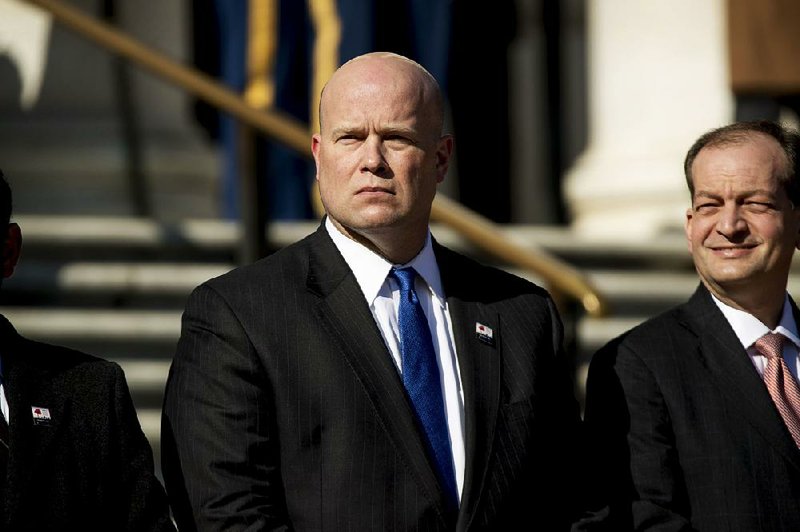Maryland's top lawyer asked a federal judge Tuesday to block Matthew Whitaker from serving as acting U.S. attorney general, contending that the appointment is illegal.
Maryland Attorney General Brian Frosh, a Democrat, said President Donald Trump's appointment of Whitaker to the nation's highest law enforcement post is unconstitutional and that he should be replaced by Deputy Attorney General Rod Rosenstein, who was confirmed by the Senate.
"Few positions are more critical than that of U.S. Attorney General, an office that wields enormous enforcement power and authority over the lives of all Americans," Frosh said in a statement.
Trump tapped Whitaker to serve as acting attorney general last week after Jeff Sessions resigned at the president's request. Whitaker's elevation has raised concerns about his qualifications, his past statements as a U.S. Senate candidate and his business practices.
The legal challenge to Whitaker's appointment comes as part of Maryland's ongoing federal lawsuit that is trying to force the Trump administration to uphold a key provision of the Patient Protection and Affordable Care Act.
"Who the attorney general is at the core of this lawsuit," Frosh said in an interview Tuesday.
The health care lawsuit names Sessions as an individual defendant.
The state asks U.S. District Judge Ellen Hollander, who has the health care case, to substitute Rosenstein as the defendant in place of Sessions, a move that would effectively declare him the proper attorney general.
"Aside from the constitutional issue, this guy, Mr. Whitaker, has extreme views and that's dangerous in itself," said Frosh, adding he also expects any ruling in the state challenge to Whitaker's role would be appealed.
Frosh was not required to notify Republican Gov. Larry Hogan about a motion in an existing case. Hogan spokesman Amelia Chasse said the governor's office received no previous communication about the filing and declined to comment on it.
The legal action over Whitaker, first reported by NPR, says his appointment violates the Constitution's Appointments Clause that requires "principal" senior officials, like the attorney general, to be confirmed by the Senate. Maryland also contends it violates a federal statute that lays out the line of succession and gives authority to the deputy attorney general when the top job is vacant.
A Justice Department spokesman declined to comment on the Maryland filing.
In defending Whitaker's appointment as lawful, the Trump administration has pointed to the Federal Vacancies Reform Act, a 1998 statute. It says that a president may temporarily fill a vacancy for a position that normally requires Senate confirmation with any senior official who has been in the department for at least 90 days. As Sessions' former chief of staff, Whitaker meets that criteria.
A number of current and former government lawyers have said that while elevating Whitaker to attorney general was unwise and unprecedented, it is not illegal.
Frosh's office said Tuesday that any action Whitaker takes in the health care case on behalf of the federal government would be invalid because Whitaker should not be serving as acting attorney general.
Maryland lawyers filed the underlying lawsuit in September after Sessions told Congress the Justice Department would not defend central provisions of the health care act including protections for people with pre-existing conditions.
Now that Whitaker is serving as acting attorney general, he is in position to make decisions on behalf of the federal government, including in the health care litigation.
"It is troubling, to say the least, that the President is attempting to fill a 'vacancy' he created himself with a 'temporary' appointment that might last for many months or years," according to the filing from Frosh's office.
"It is especially troubling that the temporary appointee has not been confirmed by the Senate for his underlying position; the President might reasonably be seen as appointing a loyalist in a way that deliberately circumvents the Senate's constitutional advice-and-consent role."
The state's lawyers say that in addition to their concerns over the line of succession, Whitaker has "expressed idiosyncratic views that are inconsistent with longstanding Department of Justice policy."
They cite his criticism of the landmark Supreme Court opinion Marbury v. Madison, which ensured that courts had authority to strike down laws they considered unconstitutional.
Critics, including top House Democrats who will take control of key committees in January, say they fear that Trump chose Whitaker to be acting attorney general in order to curtail or stop special counsel Robert Mueller's investigation of Russian interference in the 2016 election.
Sen. Dianne Feinstein, Calif., the Senate Judiciary Committee's top Democrat, also raised concerns Tuesday about Whitaker's appointment and called for hearings to better address the "serious questions" surrounding Trump's shake-up at the Justice Department and how it could affect the ongoing investigation.
Whitaker is now supervising the special counsel investigation. He has been publicly critical of the inquiry in the past. As a CNN commentator, he said it risked becoming a "witch hunt."
In a letter to the committee's chairman, Sen. Charles Grassley, R-Iowa, Feinstein said she wants Whitaker to assure lawmakers "he will take no action to restrict or otherwise interfere with" the investigation.
Grassley said Tuesday that he takes no issue with comments from Whitaker that disparaged the Mueller investigation, "as long as he made them as a private citizen."
"It seems to me that the president's the chief executive, and the president said he wasn't going to do that," Grassley said of the ongoing special counsel investigation. "So, doesn't matter what Whitaker thinks. The president said it isn't going to be done."
The Justice Department has said that Whitaker would consult with ethics officials on specific matters if it's appropriate.
"Acting Attorney General Matt Whitaker is fully committed to following all appropriate processes and procedures at the Department of Justice, including consulting with senior ethics officials on his oversight responsibilities and matters that may warrant recusal," department spokesman Kerri Kupec said Monday in a statement that didn't address the Mueller investigation.
Whitaker could take a number of actions affecting the inquiry because he controls the composition of Mueller's team and its budget and he must approve major investigative steps, including indictments.
Whitaker put out a statement shortly after taking the job that he would lead the department "with the highest ethical standards."
Information for this article was contributed by Ann E. Marimow, Ovetta Wiggins, John Wagner, Devlin Barrett and Seung Min Kim of The Washington Post; by Charlie Savage of The New York Times; by Eric Tucker and Michael Kunzelman of The Associated Press; and by Erik Wasson, Steven T. Dennis and Chris Strohm of Bloomberg News.
A Section on 11/14/2018

